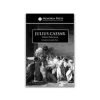Your bag is empty
Don't miss out on great deals! Start shopping or Sign in to view products added.
Shop What's New Sign in$22.50
Available in stock
Drawn from history as recorded by Plutarch, the major characters – Caesar, Brutus, Cassius, and Mark Antony – are complex, as are the twists and turns of their fortunes. What kind of man rises to power? What price does he pay when he becomes a politician? These questions raised by Shakespeare are relevant in every age, whether ancient Rome, Elizabethan England, or even our own day.
Shakespeare probably wrote Julius Caesar in the latter half of 1599, at the end of one of the most turbulent centuries in English history. It says as much or more about Shakespeare’s own time than about the time in which it is set. It is a play about power. It’s also about those who possess it and those who want to.
It is a reflection of Lord Acton’s adage: “Power tends to corrupt and absolute power tends to corrupt absolutely. Great men are almost always bad men.” Julius Caesar is about four great men who are corrupted by power or the desire for power: Caesar himself, Cassius, Brutus, and Mark Antony are classically tragic heroes. They might not always be bad men but they are certainly not good men.
The Student Guide contains vocabulary studies, reading notes, comprehension questions, Socratic discussion questions, work with quotes, and literary and rhetorical devices. Each of these lessons contains vocabulary work, journal prompts, quotes, and comprehension questions. The Teacher Guide provides all answers to questions, and quizzes and tests.
Our study guides train students to become active readers. Students think about what they have read and learn to identify the important content of each story. These study guides also teach the advanced skill of composing answers that are both clear and concise, a difficult skill at any age. Writing is thinking, and good questioning stimulates the child to think and write.
Companion Resources:
Julius Caesar
Julius Caesar – Student Guide (Second Edition)
Julius Caesar – Teacher Guide (Second Edition)
Julius Caesar – Set
Tenth Grade Curriculum Package
| Weight | .3 kg |
|---|---|
| Dimensions | 8 × 5.3 × .9 in |
| ISBN | 9781547706167 |
| Published Date | 2024 |
| Author | William Shakespeare |
| Publisher | Memoria Press |
| Format | Paperback |

Reviews
There are no reviews yet